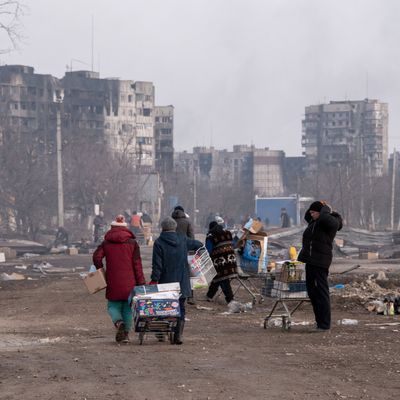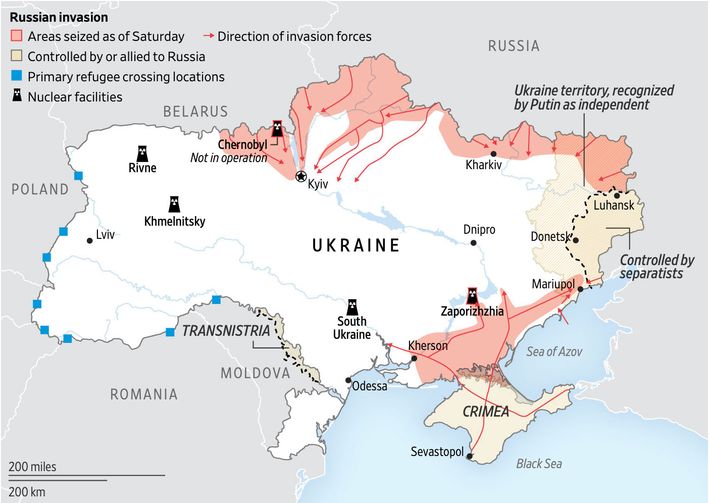
When Vladimir Putin launched this invasion of Ukraine, he described it as a humanitarian mission aimed at saving Russian-speaking Ukrainians from “genocide.” Yet Putin’s military is currently concentrating its most savage violence on the Russian-speaking city of Mariupol.
Russia has kept Mariupol under siege for weeks, choking off access to food, water, and medicine for its more than 200,000 remaining civilians. At the same time, Russia has subjected the city to indiscriminate bombardment, incinerating basic infrastructure, maternity wards, and shelters for displaced civilians. It has reportedly transferred thousands of the city’s residents into Russia against their will. In recent days, the shelling in Mariupol grew so pervasive it reduced Ukraine’s tenth-largest city to the “ashes of a dead land,” in the words of its local council. By some estimates, 80 percent of the city has been destroyed.
Russia presented the Ukrainian government with an ultimatum over the weekend: Surrender Mariupol by Monday at sunrise and Moscow would allow its residents to escape unharmed; fight on and it would make no such assurances. The Zelenskyy government refused this demand.
These developments may puzzle a lay observer. Why would Russia concentrate its wrath on what was once a bastion of pro-Russian sentiment in Ukraine? And why would the Ukrainian government refuse to surrender the city given the harrowing humanitarian implications of holding out and Russia’s overwhelming strength in the part of eastern Ukraine where Mariupol sits?
Part of the answer is, of course, that Putin does not actually care about Russian-speaking Ukrainians as human beings but only as living testaments to the Russian empire’s right to rule Ukraine, according to the dictates of his abstruse ethno-national mythology.
This explains why Putin would be willing to put Mariupol through hell but not why he has done so. The explanation for that, as well as for Ukraine’s intransigence in forfeiting the city, concerns its strategic importance to the broader conflict.
The outcome of the fighting at Mariupol could have a decisive impact for three primary reasons:
1.
Conquering Mariupol is central to Putin’s “plan B.”
By most accounts, Putin’s initial war plan presumed swift and total victory. He aimed to dissolve the Ukrainian military, topple Zelenskyy’s government, and install a puppet regime in Kyiv. And he believed he could do so quickly, through a limited commitment of troops. The Kremlin’s intelligence and ideology led it to believe that Ukrainian nationalism was a western import foisted on an indifferent market and that few Ukrainians would be willing to die for Zelenskyy’s unpopular regime.
This proved to be a catastrophic mistake. More than three weeks into the war, Russia has yet to secure control of a single major Ukrainian city, even as it has lost upwards of 7,000 troops. The Russian military faces grave logistical challenges and morale problems, along with a shortage of precision-guided munitions; meanwhile, western sanctions are devastating the Russian economy. For Putin’s regime, the costs of attempting to achieve its initial objectives look vast whether measured in blood or money. And even if Russia were able to conquer the entirety of Ukraine through siege and bombardment tactics, how could its puppet government possibly command legitimacy over more than 40 million Ukrainians newly unified in their antipathy toward Moscow?
The Kremlin seems to recognize that its initial objectives were quixotic. In negotiations last week, it entertained allowing Ukraine to keep its military and government in exchange for committing to neutrality between Russia and the west, forswearing NATO membership, and surrendering Russian-occupied territories in the eastern part of the country, including the separatist ministates of Donetsk and Luhansk.
This would still be a fraught and ambitious endgame for Russia. Governing an embittered eastern Ukrainian population won’t be easy, but it is much more feasible than conquering the entire country.
Mariupol is critical to this plan B. As The Wall Street Journal illustrates, Mariupol sits directly between Russian-annexed Crimea and the breakaway republics of Donetsk and Luhansk. If Russia can secure control of the city and its surrounding area, it can construct a “land bridge” between its two major strongholds in Ukraine. This would aid subsequent military efforts to press deeper into Ukrainian territory and immediately establish a continuous line of Russian-dominated land in Ukraine, which could form the outline of a hefty consolation prize for Putin.
U.S. officials reportedly believe Putin now intends to demand sovereignty over that region in addition to a Ukrainian commitment to neutrality. If Ukraine rejects those demands, Russia would then attempt to bomb its cities into submission: Rather than try to actually take Kyiv at a high cost of Russian lives, Putin’s military could simply fire missiles and artillery at civilian populations from a distance until their will is broken.
Without control of the port city of Mariupol, however, Putin has no land bridge between the territories. So Russia has decided to destroy the entire city if that’s what it takes to wrest it from Ukrainian sovereignty.
2.
Mariupol is of considerable importance to the Ukrainian economy.
Mariupol is home to the largest port in the Azov Sea region and the only major port that serves the Donetsk and Luhansk areas. If Russia secures Mariupol, it will control 80 percent of Ukraine’s Black Sea coastline, enabling it to choke off much of Ukraine’s maritime trade and access to the wider world.
Mariupol is also a key center of Ukrainian metallurgical production. The nation’s leading steelmaker, Metinvest, is located in Mariupol, and its plants have come under Russian fire in recent days. Sidelining Ukraine’s heavy industry could weaken it economically and militarily (though foreign arms shipments should compensate for lost domestic production of military equipment).
In addition to undermining Ukraine’s capacity to resist further Russian advances, if Putin ultimately settles for annexing a chunk of eastern Ukraine, possession of Mariupol will make that annexation more economically valuable. By the same token, Ukraine’s loss of Mariupol would leave it considerably weaker economically, limiting its capacity to threaten Putin’s regime, whether through military strength or merely by achieving a level of prosperity that renders liberal democracy more appealing to its Russian neighbors.
3.
Mariupol’s symbolic significance amplifies its strategic importance.
Beyond its geographic and economic importance, Mariupol has symbolic weight in the Russia-Ukraine conflict.
Russian separatists briefly took the city during Putin’s first invasion of Ukraine in 2014. When Ukrainian forces managed to wrest back control of the port, it became a testament to the nation’s military resolve.
Mariupol is also the birthplace of the Azov Battalion. Once a far-right militia infamous for its neo-Nazi members, Azov proved itself sufficiently militarily useful to the Ukrainian government to win incorporation into the country’s national guard. The Azov Battalion accounts for a tiny fraction of Ukraine’s fighting forces but occupies an outsize place in Russian propaganda. Among Putin’s initial war aims was the “denazification of Ukraine.” The Russian leader had suggested that Ukraine’s entire government was complicit in Nazism and that only regime change could truly denazify the country. If Putin is pursuing a plan B, however, defeating the Azov Battalion and annexing its birthplace could serve as a substitute for full “denazification” for propaganda purposes.
As the BBC notes, Mariupol’s collapse could provide Russian forces with a much-needed morale boost while weakening Ukrainians’ resolve. The city’s residents fiercely resisted Russia’s onslaught. If that resistance gains them nothing but a more total defeat — losing not only their sovereignty but almost the entirety of their city itself — then Ukrainians in other urban centers may prove less willing to withstand sieges and shelling in the weeks and months to come.































